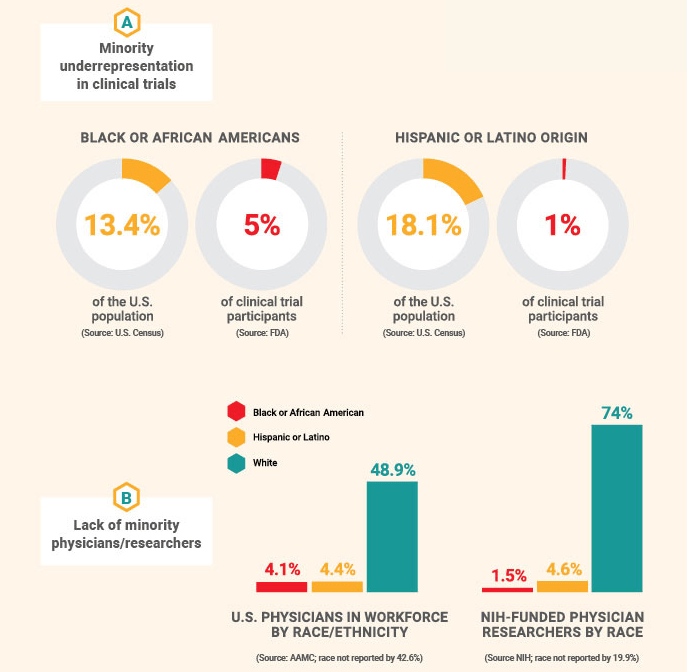
How to Increase Our Hispanic Population’s Participation in Biomedical Research
Diversity is critical to unlocking the power of precision medicine and fueling research for novel treatments, diagnostics, and interventions. Despite efforts to improve diversity in recent years, there remains an overrepresentation of those identifying as Non-Hispanic white in biomedical research and an underrepresentation of those identifying as Hispanic/Latino, Black/African American, Asian, and American Indian/Alaskan Native. The most significant discrepancy is among those identifying as Hispanic/Latinos: despite representing 18% of the U.S. population, Latinos comprise less than 1% of participants in clinical trials that report race/ethnicity data.

As digital technologies become more integrated into research and health care, public, private, and non-profit efforts have been made to address the lack of inclusion of historically underrepresented groups. In May 2022, DiMe’s Digital Health Measurement Collaborative Community (DATAcc), a partnership between DiMe and the FDA’s Center for Diagnostic and Radiologic Health, released resources to advance health equity. DATAcc’s two comprehensive toolkits, which include perspectives from across the field, help bridge the gap between recognizing the need to be inclusive and taking steps to be more inclusive when developing and deploying digital health measurement products.
This Hispanic Heritage Month, we challenge all organizations to start leveraging DATAcc’s toolkits for inclusive deployment to help increase our Hispanic population’s participation in biomedical and clinical research concerted efforts are required by stakeholders from across the healthcare ecosystem, including funders and researchers, to curtail existing disparities and prevent further exacerbation of inequalities.
3 Ways to Be More Inclusive in Your BioMedical Research
- Engage directly with the Hispanic community. You can start with the guide for developing community partnerships. Here you will find specific recommendations and resources that will help build trust with the communities you need to reach.
- Use clear, culturally appropriate messaging. Leverage the tools for implementing inclusivity to develop culturally specific messaging at the appropriate reading level and with the appropriate format to appeal to diverse communities.
- Recognize that the Hispanic community is diverse. There is no one-size-fits-all process for ensuring inclusivity. Use the resources for inclusive deployment to customize workflows that will facilitate engagement and long-term participation.
Follow our detailed instructions so you can be more inclusive and supportive, ensuring that Hispanic patients have the resources they need to participate fully in your research.
Act Now or Face Consequences Later
There are serious consequences and costs associated with excluding large swaths of the population from research. For one, many clinical trials fail due to a lack of proportionate representation. Even when non-representative studies succeed, underrepresentation can compromise the generalizability of research findings, worsen the lack of trust in biomedical research, exaggerate hesitancy to engage with care, and promote health inequity.
With the application of digital tools comes the responsibility of ensuring all who can benefit from them have access. Gaps in health data on underrepresented groups only compound the effects of health disparities and risks to public health. We are at a critical juncture in the digitization of healthcare and have the opportunity to use digital tools as a mechanism to improve – rather than exacerbate – equity and inclusion.

DiMe is proud to continue bringing life science companies; diversity, equity, and inclusion experts; and other leaders from the health-tech continuum together in a pre-competitive environment to advance the field for all. We doubled down on our commitment to health equity this year by announcing the DE&I in Digitized Clinical Trials project. In early 2023, the project team will release action-oriented resources to help the field design trials that successfully engage, enroll, and retain underrepresented populations to improve diversity, equity, and inclusion in digitized clinical trials.
This Hispanic Heritage Month, we encourage you to reflect on the role you play in advancing health equity. DATAcc’s action-oriented resources are here to help you today and easily integrate into your existing workflow.
Are you already using these tools to power more inclusive work? Let us know and we’ll help amplify your story!



